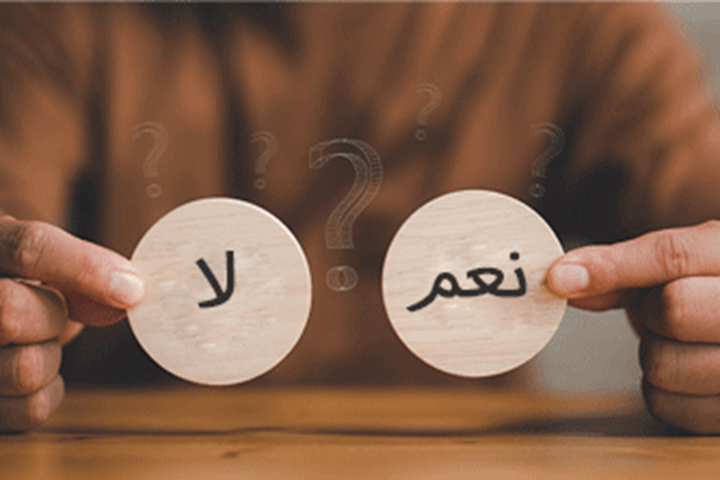Welcome to the very foundation of any conversation: saying “yes” and “no”! These simple words are essential building blocks for communication in any language, and Arabic is no exception. If you’ve been wondering “how to say yes in Arabic” or “how to say no in Arabic,” you’re about to unlock crucial phrases that will open doors to clearer interactions. This guide will teach you “yes and no in Arabic,” including common variations and cultural nuances, helping you converse with confidence. Let’s start with these two powerful words!
Saying “Yes” in Arabic: نَعَم (Na’am) and Its Friends
The most standard and universally understood way to say “yes in Arabic” is نَعَم (Na’am). This word is appropriate in almost all situations, from formal to informal.
- (Naʻam) – نَعَم
- Transliteration: Na’am
- Usage: Standard and polite, suitable for all contexts.
- Example: “Are you a student? – Yes.” – هَلْ أَنْتَ طَالِبٌ؟ – نَعَم. (hal ʼanta Taalibun? – Naʻam.)
However, just like in English where you might say “yeah,” “yep,” or “of course,” Arabic has colloquial variations that are very common in everyday speech:
- (ʼaywa) – أَيْوَه
- Transliteration: Aywa
- Usage: Very common in Egyptian and Levantine (Syrian, Lebanese, Jordanian, Palestinian) dialects. It’s informal and friendly.
- Example: “Are we going to the market? – Yeah.” – رَحْ نْرُوح السُّوق؟ – أَيْوَه. (raH nrooH assooq? – ʼaywa.)
- (ʼee) – إِي
- Transliteration: Ee
- Usage: Frequently used in Levantine dialects, informal.
- Example: “Do you want tea?” – Yep. – بِدَّك شَاي؟ – إِي. (biddak shaay? – ʼee.)
- (ʼay) – أَيْ
- Transliteration: Ay
- Usage: Common in some Gulf dialects.
- Example: “Do you want coffee? – Yeah.” – تَبْغِي قَهْوَة؟ – أَيْ. (tabghee qahwah? – ʼay.)
Responding to a Negative Question: بَلَى (Balaa)
This is a specific and more formal way to say “yes” or “on the contrary” when responding to a negative question. It means “yes, indeed” or “of course (it is so).”
- Example: “Aren’t you tired? – Yes, I am. (or: On the contrary, I am.)” – أَلَسْتَ مُتْعَبًا؟ – بَلَى. (ʼalasta mutʿaban? – Balaa.)
Saying “No” in Arabic: لَا (Laa) and Polite Refusals
The universal way to say “no in Arabic” is لَا (Laa). This word is clear and understood everywhere.
- (Laa) – لَا
- Transliteration: Laa
- Usage: Standard and appropriate for all contexts.
- Example: “Do you speak French? – No.” – هَلْ تَتَحَدَّثُ الْفَرَنْسِيَّةَ؟ – لَا (hal tataHaddathu alfaransiyyah? – Laa.)
How to Say No in Arabic Politely:
While لَا (Laa) is always correct, in Arab culture, direct refusals can sometimes be softened, especially in hospitality situations, to avoid causing offense.
- Adding “Shukran” (Thank you):
- لَا، شُكْرًا (Laa, shukran.) – No, thank you. (A polite way to decline an offer.)
- Example: “Do you want more food? – No, thank you.” – هَلْ تُرِيدُ مَزِيدًا مِنَ الطَّعَامِ؟ – لَا، شُكْرًا (hal tureedu mazeedan min aTTaʻaam? – Laa, shukran.)
- Using “Min Faḍlik” (Please):
- لَا، مِنْ فَضْلِكَ (Laa, min fadhlika.) – No, please. (To a male, to soften a refusal or indicate disagreement gently.)
- Indirect Refusal/Hesitation: Sometimes, rather than a direct “no,” people might use phrases that imply “it’s difficult,” “maybe later,” or “I’ll try.” Observing native speakers in various situations can be very insightful.
Yes and No in Arabic: Practical Scenarios
Let’s see “yes and no in Arabic” in action with a few practical phrases:
- Asking and Answering:
- Question: “Are you ready?” – هَلْ أَنْتَ جَاهِزٌ؟ (hal ʼanta jaahizun?)
- Yes: “Yes, I am ready.” – نَعَم، أَنَا جَاهِزٌ (naʻam, ʼana jaahizun.)
- No: “No, I’m not ready yet.” – لَا، لَسْتُ جَاهِزًا بَعْدُ (Laa, lastu jaahizan baʿdu.)
- Offering and Declining:
- Offer: “Do you want coffee?” – تُرِيدُ قَهْوَة؟ (Tureedu qahwah?)
- Yes (informal): “Yeah, thanks.” – أَيْوَه، شُكْرًا (ʼaywa, shukran.)
- No (polite): “No, thank you very much.” – لَا، شُكْرًا جَزِيلًا (Laa, shukran jazeelan.)
Tips for Using “Yes” and “No” in Arabic
- Context is Key: Always pay attention to the formality of the situation and your relationship with the person you’re speaking to.
- Observe: Watch how native speakers use نَعَم and لَا, and their colloquial alternatives, in different scenarios.
- Don’t Overthink: While politeness is valued, using نَعَم and لَا directly is always grammatically correct and widely understood. The effort to speak Arabic will be appreciated!
Mastering “yes in Arabic” and “no in Arabic” is a fundamental step in your language journey. These words, though simple, open the door to countless conversations and deeper cultural understanding.
Ready to confidently say “yes and no in Arabic” and much more? Visit www.kaleela.com and download the Kaleela Arabic learning app today! Our comprehensive lessons will help you master essential vocabulary, practice real-world conversations, and immerse yourself in Arab culture. Start speaking Arabic with confidence!



